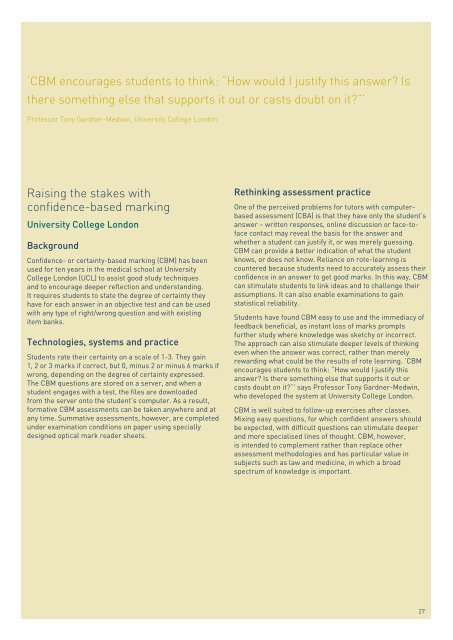Effective Practice with e-Assessment: An overview of ... - Jisc
Effective Practice with e-Assessment: An overview of ... - Jisc
Effective Practice with e-Assessment: An overview of ... - Jisc
Create successful ePaper yourself
Turn your PDF publications into a flip-book with our unique Google optimized e-Paper software.
‘CBM encourages students to think: “How would I justify this answer? Is<br />
there something else that supports it out or casts doubt on it?”’<br />
Pr<strong>of</strong>essor Tony Gardner-Medwin, University College London<br />
Raising the stakes <strong>with</strong><br />
confidence-based marking<br />
University College London<br />
Background<br />
Confidence- or certainty-based marking (CBM) has been<br />
used for ten years in the medical school at University<br />
College London (UCL) to assist good study techniques<br />
and to encourage deeper reflection and understanding.<br />
It requires students to state the degree <strong>of</strong> certainty they<br />
have for each answer in an objective test and can be used<br />
<strong>with</strong> any type <strong>of</strong> right/wrong question and <strong>with</strong> existing<br />
item banks.<br />
Technologies, systems and practice<br />
Students rate their certainty on a scale <strong>of</strong> 1-3. They gain<br />
1, 2 or 3 marks if correct, but 0, minus 2 or minus 6 marks if<br />
wrong, depending on the degree <strong>of</strong> certainty expressed.<br />
The CBM questions are stored on a server, and when a<br />
student engages <strong>with</strong> a test, the files are downloaded<br />
from the server onto the student’s computer. As a result,<br />
formative CBM assessments can be taken anywhere and at<br />
any time. Summative assessments, however, are completed<br />
under examination conditions on paper using specially<br />
designed optical mark reader sheets.<br />
Rethinking assessment practice<br />
One <strong>of</strong> the perceived problems for tutors <strong>with</strong> computerbased<br />
assessment (CBA) is that they have only the student’s<br />
answer – written responses, online discussion or face-t<strong>of</strong>ace<br />
contact may reveal the basis for the answer and<br />
whether a student can justify it, or was merely guessing.<br />
CBM can provide a better indication <strong>of</strong> what the student<br />
knows, or does not know. Reliance on rote-learning is<br />
countered because students need to accurately assess their<br />
confidence in an answer to get good marks. In this way, CBM<br />
can stimulate students to link ideas and to challenge their<br />
assumptions. It can also enable examinations to gain<br />
statistical reliability.<br />
Students have found CBM easy to use and the immediacy <strong>of</strong><br />
feedback beneficial, as instant loss <strong>of</strong> marks prompts<br />
further study where knowledge was sketchy or incorrect.<br />
The approach can also stimulate deeper levels <strong>of</strong> thinking<br />
even when the answer was correct, rather than merely<br />
rewarding what could be the results <strong>of</strong> rote learning. ‘CBM<br />
encourages students to think: “How would I justify this<br />
answer? Is there something else that supports it out or<br />
casts doubt on it?”’ says Pr<strong>of</strong>essor Tony Gardner-Medwin,<br />
who developed the system at University College London.<br />
CBM is well suited to follow-up exercises after classes.<br />
Mixing easy questions, for which confident answers should<br />
be expected, <strong>with</strong> difficult questions can stimulate deeper<br />
and more specialised lines <strong>of</strong> thought. CBM, however,<br />
is intended to complement rather than replace other<br />
assessment methodologies and has particular value in<br />
subjects such as law and medicine, in which a broad<br />
spectrum <strong>of</strong> knowledge is important.<br />
27
















